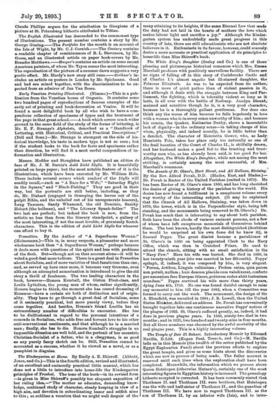Transition. By the Author of "A Superfluous Woman." (Heinemann.)—This is,
in many respects, a pleasanter and more wholesome book than "A Superfluous Woman," perhaps because -it deals more with questions of the spirit and less with problems -of the flesh. But—though not on that account alone—it will be voted a good deal more tedious. There is a great deal in Transition about Socialism, and of more varieties of that fanaticism than one ; and, as served up here once more, it becomes very tiresome, even although an attempted assassination is introduced to give the old atory a thrill of freshness. The two leading characters in the book, however—Honora Kemball, the Girton First-class, and Leslie Lyttelton, the young man of whom, rather significantly, Honore, begins to think, the moment she has ceased dreaming of Erasmus—have a certain air both of distinction and of origin- ality. They have to go through a great deal of Socialism, some -of it eminently practical, but more purely viewy, before they come together. And besides, Honora's friend Lucille has an extraordinary number of difficulties to encounter. She has to be disillusionei in regard to the personal intentions of a -comrade in Socialism, who adds free and fervent love to his other anti-conventional sentiments, and that although he is a married man ; finally, she has to die. Honore Kemball's struggles in an impossible situation are well told, and the portrait of her eccentric Christian-Socialist of a father, who is a clergyman, is as good -as any purely fancy sketch can be. Still, Transition cannot be -accounted as a success, whether it be viewed as a novel, or as a pamphlet in disguise.


































 Previous page
Previous page